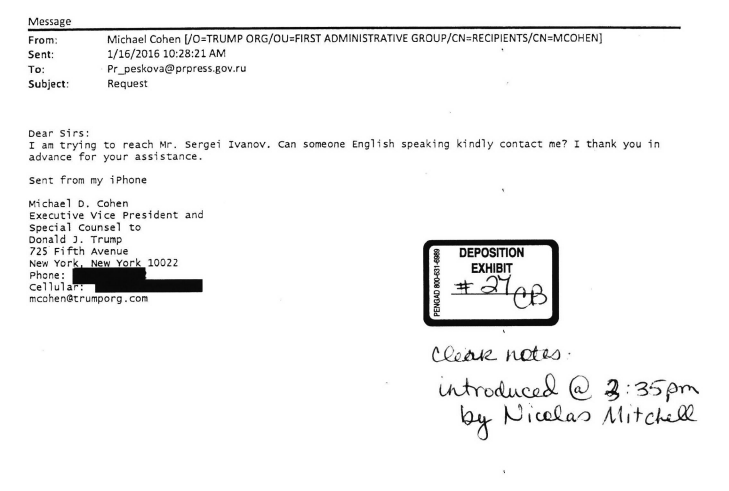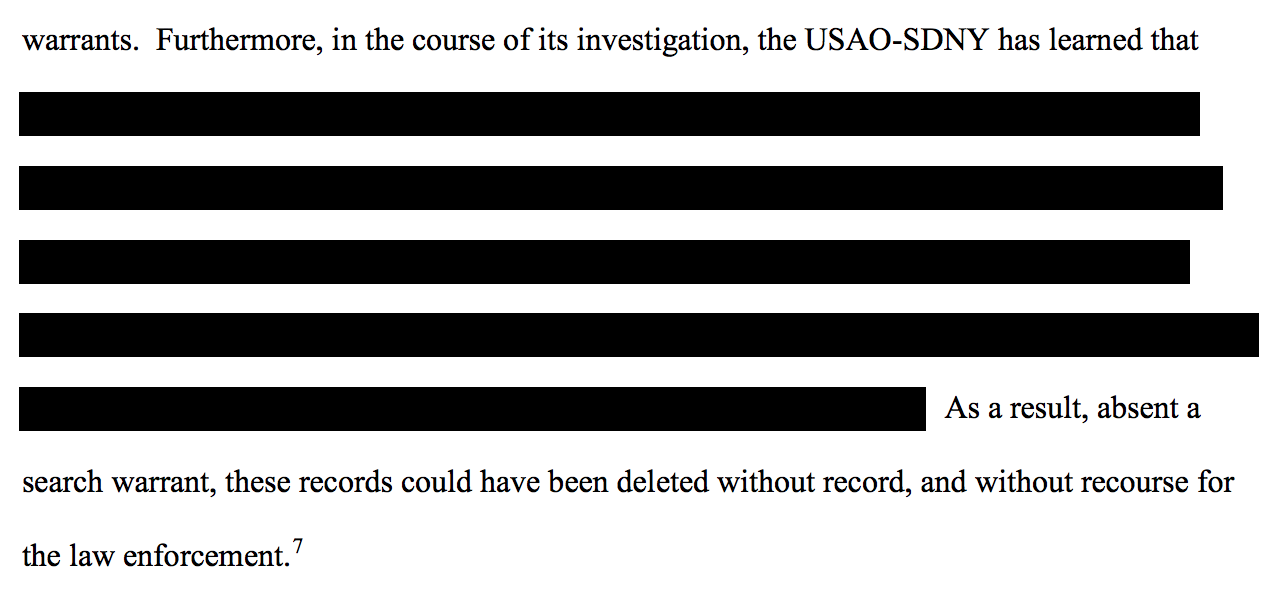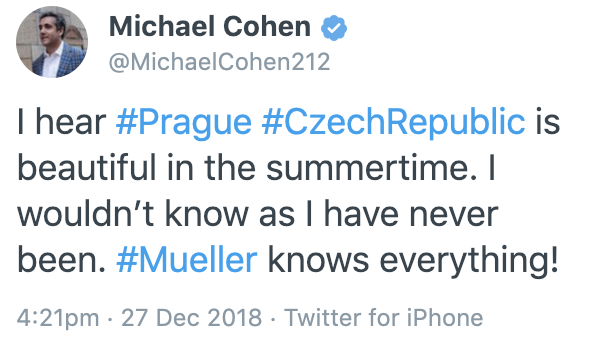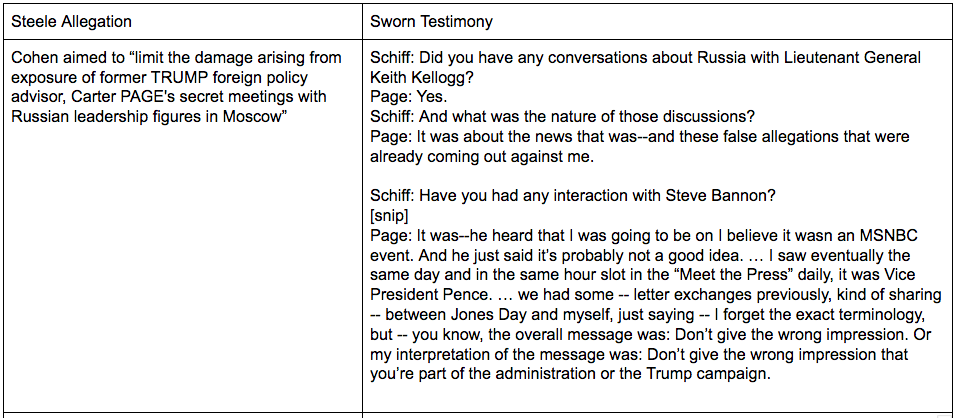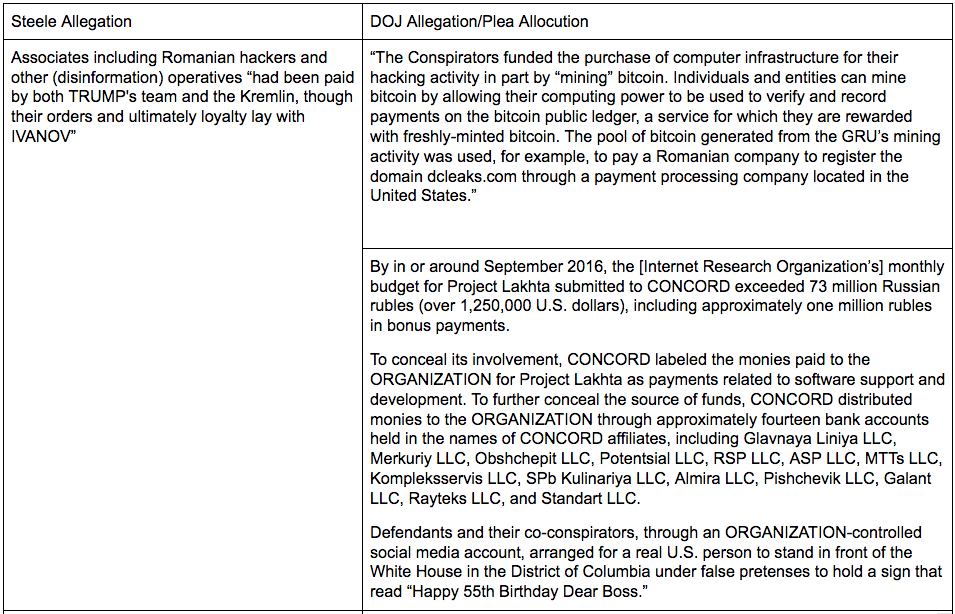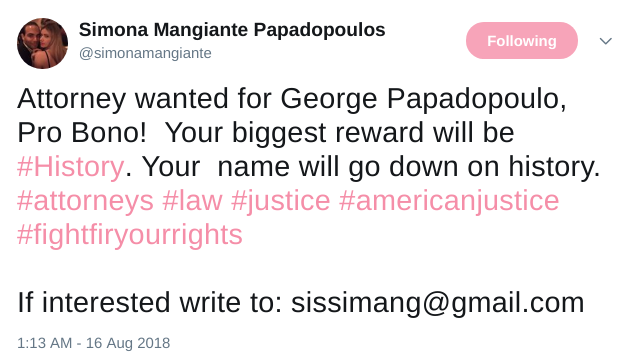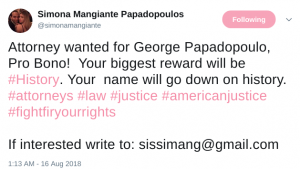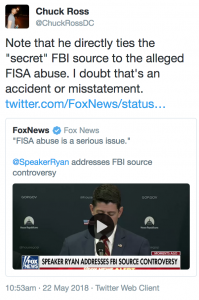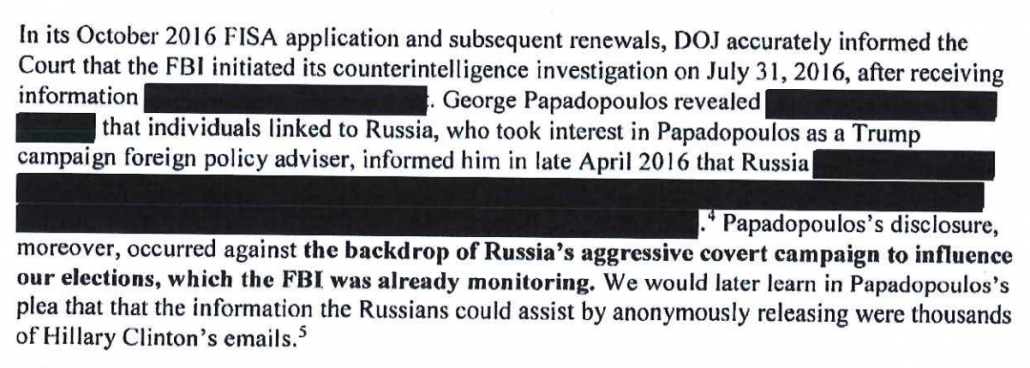Michael Cohen’s HPSCI Testimony Proves Trump Lied in his Answers to Mueller
Yesterday, the House Intelligence Committee released transcripts of Michael Cohen’s February 28 and March 6 testimony before the committee. Together they’re utterly damning for a bunch of reasons:
- GOPers (with former US Attorney John Ratcliffe incompetently replacing Trey Gowdy as their designated “adult”) thought they could prove that Cohen hadn’t been offered a pardon, but proved the opposite; on top of looking like blithering idiots, it basically put them in the position of laying out proof of — then shrugging away — crime after Trump crime
- As I anticipated at the time, Cohen makes clear that any Joint Defense Agreement involving him lasted only so long as Trump believed Cohen could hurt him
- On top of providing details about the editing of his false statement, Cohen lays out how in conversations before the first draft, Jay Sekulow got him to shorten the timeframe of the Moscow Trump Tower deal
- Cohen confirmed that — as I laid out in January — there was a gap in the documents shared with HPSCI necessary to sustain the false story
Perhaps most surprising, though, Cohen’s testimony establishes that Trump lied to Robert Mueller in his sworn answers.
Trump’s responses on Trump Tower questions were the least responsive of his many non-responsive answers
Far too little attention has been focused on Trump’s downright contemptuous responses to Mueller’s questions, many of which conflict with the testimony of numerous loyal Trump people. Worst of all were Trump’s response to seven questions on the Trump Tower deal.
a. In October 2015, a “Letter of Intent,” a copy of which is attached as Exhibit B, was signed for a proposed Trump Organization project in Moscow (the “Trump Moscow project”).
i. When were you first informed of discussions about the Trump Moscow project? By whom? What were you told about the project?
ii. Did you sign the letter of intent?
b. In a statement provided to Congress, attached as Exhibit C, Michael Cohen stated: “To the best of my knowledge, Mr. Trump was never in contact with anyone about this proposal other than me on three occasions, including signing a non-binding letter of intent in 2015.” Describe all discussions you had with Mr. Cohen, or anyone else associated with the Trump Organization, about the Trump Moscow project, including who you spoke with, when, and the substance of the discussion(s).
c. Did you learn of any communications between Michael Cohen or Felix Sater and any Russian government officials, including officials in the office of Dmitry Peskov, regarding the Trump Moscow project? If so, identify who provided this info1mation to you, when, and the substance of what you learned.
d. Did you have any discussions between June 2015 and June 2016 regarding a potential trip to Russia by you and/or Michael Cohen for reasons related to the Trump Moscow project? If yes, describe who you spoke with, when, and the substance of the discussion(s).
e. Did you at any time direct or suggest that discussions about the Trump Moscow project should cease, or were you informed at any time that the project had been abandoned? If yes, describe who you spoke with, when, the substance of the discussion(s), and why that decision was made.
f. Did you have any discussions regarding what information would be provided publicly or in response to investigative inquiries about potential or actual investments or business deals the Trump Organization had in Russia, including the Trump Moscow project? If yes, describe who you spoke with, when, and the substance of the discussion(s).
g. Aside from the Trump Moscow project, did you or the Trump Organization have any other prospective or actual business interests, investments, or arrangements with Russia or any Russian interest or Russian individual during the campaign? If yes, describe the business interests, investments, or arrangements.
In response, Trump wrote three paragraphs.
Response to Question III, Parts (a) through (g)
Sometime in 2015, Michael Cohen suggested to me the possibility of a Trump Organization project in Moscow. As I recall, Mr. Cohen described this as a proposed project of a general type we have done in the past in a variety of locations. I signed the non-binding Letter of Intent attached to your questions as Exhibit B which required no equity or expenditure on our end and was consistent with our ongoing efforts to expand into significant markets around the world.
I had few conversations with Mr. Cohen on this subject. As I recall, they were brief, and they were not memorable. I was not enthused about the proposal, and I do not recall any discussion of travel to Russia in connection with it. I do not remember discussing it with anyone else at the Trump Organization, although it is possible. I do not recall being aware at the time of any communications between Mr. Cohen or Felix Sater and any Russian government official regarding the Letter of Intent. In the course of preparing to respond to your questions, I have become aware that Mr. Cohen sent an email regarding the Letter of Intent to “Mr. Peskov” at a general, public email account, which should show there was no meaningful relationship with people in power in Russia. I understand those documents already have been provided to you.
I vaguely remember press inquiries and media reporting during the campaign about whether the Trump Organization had business dealings in Russia. I may have spoken with campaign staff or Trump Organization employees regarding responses to requests for information, but I have no current recollection of any particular conversation, with whom I may have spoken, when, or the substance of any conversation. As I recall, neither I nor the Trump Organization had any projects or proposed projects in Russia during the campaign other than the Letter of Intent.
The first paragraph is factually accurate. The last paragraph is correct (as far as we know) with respect to having no other proposed projects, but is utterly non-responsive to a question about the response to investigative questions (including these ones) regarding the project, in part because Trump only agreed to answer questions pertaining to the campaign period.
The middle paragraph, however, is inconsistent with the documentary record, but consistent with the false statement that Cohen is now sitting in prison for.
After Cohen pled guilty, Mueller offered Trump a chance to correct his testimony, but he refused
Because I get into why that is, consider that, in the wake of Cohen’s plea, Trump admitted to remembering that the deal may have gone through the end of the campaign (the LOI was only withdrawn after the election) and Rudy ran his mouth admitting that the project went through November. In response, Mueller asked follow-up questions.
In light of the President’s public statements following Cohen’s guilty plea that he “decided not to do the project,” this Office again sought information from the President about whether he participated in any discussions about the project being abandoned or no longer pursued, including when he “decided not to do the project,” who he spoke to about that decision, and what motivated the decision. 1057 The Office also again asked for the timing of the President’s discussions with Cohen about Trump Tower Moscow and asked him to specify “what period of the campaign” he was involved in discussions concerning the project. 1058 In response, the President’s personal counsel declined to provide additional information from the President and stated that “the President has fully answered the questions at issue.” 1059
1057 1/23/19 Letter, Special Counsel’s Office to President’s Personal Counsel.
1058 1/23/ 19 Letter, Special Counsel’s Office to President’s Personal Counsel.
1059 2/6/ l 9 Letter, President’s Personal Counsel to Special Counsel’s Office.
On this matter, then, Trump made comments to the public after submitting his responses to Mueller that made it clear his claims to not recall these matters were false. When Mueller gave him the opportunity to fix his testimony, he refused.
Part of Trump’s response exactly replicates the lies Cohen told, in a statement prepared with the input of Jay Sekulow, to Congress
With that in mind, consider the substance of that middle paragraph. It repeats the key lies that Cohen pled guilty to in December:
- Trump and Cohen only have a few (three) conversations about the deal rather than ten or more
- Trump did not know of any travel plans to Russia
- Trump didn’t discuss the project with anyone else at Trump Org, including Ivanka and Don Jr
- Cohen’s attempt to contact Dmitry Peskov in January 2016 was via a public email address and proved unsuccessful
Compare those lies with the three main lies Cohen pled guilty to.
- The Moscow Project ended in January 201 6 and was not discussed extensively with others in the Company.
- COHEN never agreed to travel to Russia in connection with the Moscow Project and “never considered” asking Individual 1 to travel for the project.
- COHEN did not recall any Russian government response or contact about the Moscow Project.
Not knowing (or caring) that his former fixer was already cooperating with Mueller, Trump repeated precisely the same lies Cohen is now in prison for, did so under oath, and refused to fix those responses when given an opportunity to.
Cohen’s testimony, however, makes these lies even more damning.
The Trump Organization withheld the documents that would have made it clear Cohen was lying from the Committees
Again, as I noted back in January, there is no way that the lies Cohen told SSCI and HPSCI would have been sustainable if the committees had gotten all the documents they asked for. Specifically, three emails referenced in Cohen’s statement of the offense could not have been turned over to the committees without them figuring out he was lying.
On or about January 14, 2016 , COHEN emailed Russian Official 1’s office asking for assistance in connection with the Moscow Project.
On or about January 16, 2016, COHEN emailed Russian Official 1’s office again , said he was trying to reach another high- level Russian official, and asked for someone who spoke English to contact him.
On or about January 20, 2016, COHEN received an email from the personal assistant to Russian Official 1 (“Assistant 1”) , stating that she had been trying to reach COHEN and requesting that he call her using a Moscow-based phone number she provided.
Cohen’s story (and the one Trump submitted as his sworn testimony) is that he tried emailing Dmitry Peskov’s office just once, and that via a public email address. But as Mueller describes it — citing three emails from Cohen and one response from Peskov’s assistant Elena Poliakova — he wrote one email in which he fat-fingered the address for Peskov’s email, one to the general press line, and a second to Peskov’s email. In response, Poliakova wrote back, stating, “I can’t get through to both your phones. Pls, call me.”
On January 11, 2016, Cohen emailed the office of Dmitry Peskov, the Russian government’s press secretary, indicating that he desired contact with Sergei Ivanov, Putin’s chief of staff. Cohen erroneously used the email address “[email protected]” instead of “Pr [email protected] .ru,” so the email apparently did not go through.346 On January 14, 2016, Cohen emailed a different address ([email protected]) with the following message:
Dear Mr. Peskov, Over the past few months, I have been working with a company based in Russia regarding the development of a Trump Tower-Moscow project in Moscow City. Without getting into lengthy specifics, the communication between our two sides has stalled. As this project is too important, I am hereby requesting your assistance. I respectfully request someone, preferably you; contact me so that I might discuss the specifics as well as arranging meetings with the appropriate individuals. I thank you in advance for your assistance and look forward to hearing from you soon.347
Two days later, Cohen sent an email to [email protected], repeating his request to speak with Sergei Ivanov.348 Cohen testified to Congress, and initially told the Office, that he did not recall receiving a response to this email inquiry and that he decided to terminate any further work on the Trump Moscow project as of January 2016. Cohen later admitted that these statements were false. In fact, Cohen had received (and recalled receiving) a response to his inquiry, and he continued to work on and update candidate Trump on the project through as late as June 2016.349
On January 20, 2016, Cohen received an email from Elena Poliakova, Peskov’s personal assistant. Writing from her personal email account, Poliakova stated that she had been trying to reach Cohen and asked that he call her on the personal number that she provided.350 Shortly after receiving Poliakova’s email, Cohen called and spoke to her for 20 minutes.351
346 1/11/16 Email, Cohen to [email protected] (9: 12 a.m.).
347 1/14/16 Email, Cohen to [email protected] (9:21 a.m.).
348 1/16/16 Email, Cohen to [email protected] (10:28 a.m.).
349 Cohen Information ,i,i 4, 7. Cohen’s interactions with President Trump and the President’s lawyers when preparing his congressional testimony are discussed further in Volume II. See Vol. II, Section 11.K.3, infra.
350 1/20/1 6 Email, Poliakova to Cohen (5 :57 a.m.) (“Mr. Cohen[,] I can’t get through to both your phones. Pis, call me.”).
351 Telephone records show a 20-minute call on January 20, 2016 between Cohen and the number Poliakova provided in her email. Call Records of Michael Cohen After the call, Cohen saved Poliakova’s contact information in his Trump Organization Outlook contact list. 1/20/16 Cohen Microsoft Outlook Entry (6:22 a.m.).
The Poliakova email, by itself, would prove all the claims that Cohen got no response to be false.
As Cohen explained it, since he was no longer at Trump Organization anymore, he had to rely on Trump Org lawyers (probably Alan Garten) to comply with discovery requests. That probably means Garten is responsible for withholding the emails — particularly the Poliakova one — not just from Congress, but from Cohen.
Q Now, in your February 28th interview before this committee you mentioned that Alan Futerfas and Alan Garten, the two lawyers who were tied to The Trump Organization, were responsible for the document production that you produced to the committee in response to this committee’s May of 2017 subpoena. ls that accurate?
A That’s accurate.
[snip]
Q Do you have any information about why The Trump Organization would have withheld from this committee production of the January 141h, 2016, email from you to Peskov’s office?
A I do not.
Q Same question as to the January 161h, 2016, email from you to Peskov’s office regarding Sergei lvanov?
A I also do not.
Q Same question with regards to the January 20th,2016, email from Elena Poliyakova (ph)?
A I do not
THE CHAIRMAN: Mr. Cohen, what Mr. Mitchell is asking about is you’ve testified that the members of the joint defense agreement were aware that the written testimony that you were going to give to this committee was false. Documents that would have contradicted that timeline, namely, the three that Mr. Mitchell just referenced, were not produced to this committee. ls there any insight you can shed as to who might have been involved in withholding documentary evidence that would have contradicted your written false testimony?
MR. COHEN: Again, it would be other members of the joint defense team, but specifically at The Trump Organization level.
For reasons I’ll return to, Cohen was one of the only Trump people who got subpoenaed and therefore whose document compliance would be legally binding. But that means that Trump Org failed to comply with a subpoena issued not by Adam Schiff, but by Devin Nunes.
Cohen didn’t talk about these emails with Joint Defense Agreement lawyers, but he talked about the Poliakova one (and the follow-up call) with Trump
All that’s damning enough, especially since Trump claimed to Mueller that the documents turned over to his office would match his story (this is not the only sworn response where Trump falsely claimed the documentary record matches his testimony).
All the more so, though, because Trump is the one person that Cohen spoke to at Trump Org about receiving this Poliakova email (in addition to Felix Sater, who wrote the next day to say Putin’s office had contacted him, seemingly in response).
Indeed, immediately after his call with Poliakova, Cohen talked to Trump about how well versed she was on issues that mattered for their deal.
Q At what time did you speak to anyone at The Trump Organization about this email?
A About this specific email? I did not
Q Never?
A No. Well, actually, I apologize, that’s not true, I spoke to Mr. Trump about it.
Q When was that?
A That was after I had spoken to Ms. Poliyakova (ph).
[snip]
THE CHAIRMAN: And did I hear you to say that you spoke to Mr. Trump about your conversation with Mr. Peskov’s office?
MR. COHEN: Yes, with Ms. Poliyakova (ph).
THE CHAIRMAN: And was the conversation you had with Mr. Trump about that conversation with Ms. Poliyakova (ph) in person or by phone?
MR. COHEN: lt was in person.
THE CHAIRMAN: And how soon after your conversation with her on the phone did that take place?
MR. COHEN: Right afterwards.
THE CHAIRMAN: Can you tell us about the conversation you had with Ms Poliyakova (ph)?
MR. COHEN: I just found that she was very professional and her questions regarding the project were insightful. As an assistant, I was impressed, and I just made mention to him that I had spoken to an assistant for Peskov, and I was, again, incredibly impressed with her line of questioning regarding the project. And I made mention how nice it would be to have an assistant who asked such pertinent questions.
[snip]
THE CHAIRMAN: And by the detailed nature of her questions, you could tell that they knew a great deal about the project?
MR. COHEN: Yes.
THE CHAIRMAN: And what kind of questions did she have for you about the project?
MR. COHEN: The areas that obviously we would want to be building in. I don’t want to try to recollect the specific questions, but there were just very profess — they were very professional, talking about like the size of the project, the scope, length of time, where the construction crews were going to come from. I mean, it was a pretty insightful conversation.
Even if you buy that Trump forgot this conversation and the other seven he claims to have forgotten about a deal he very much wanted, you still need to explain why his responses, which allegedly account for the documentary evidence, nevertheless repeat the story that Cohen told based on a documentary record that Trump lawyers ensured was incomplete.
Given the great lengths Trump went to to not answer any of Mueller’s questions, it would take some doing for him to tell a demonstrable lie.
But he did just that with regards to the Trump Tower meeting — and refused to fix his testimony after he made it clear, publicly, that he had lied.
As I disclosed last July, I provided information to the FBI on issues related to the Mueller investigation, so I’m going to include disclosure statements on Mueller investigation posts from here on out. I will include the disclosure whether or not the stuff I shared with the FBI pertains to the subject of the post.


